Français | English | Castellano
A reportage from Lavrio, approximately 60 km to the southeast of Athens, done in December 2017, during a long halt in a self-governed camp of Kurdish exiles.
High on the mast, a flag of the PKK1floats above a group of two-storey buildings reminiscent of a disaffected high school. Built some sixty years ago one hour south of Athens in the harbor town of Lavrio in order to shelter refugees fleeing the Soviet Union, and located in the heart of the town a few steps away from the harbour, for the past 35 years the camp has mostly sheltered Kurdish and Turkish political exiles, mainly members or sympathizers of the PKK but also of the MLKP and of the MKP2. For the past 3 years they have been joined by Kurdish families fleeing the war in Syria. The first camp was insufficient to greet them all, a second camp was opened on a vacant lot on the outskirts of town, at the foot of hills covered in Mediterranean vegetation; this second camp is made up of refurbished containers better suited to sheltering families than the shared rooms in the main camp.
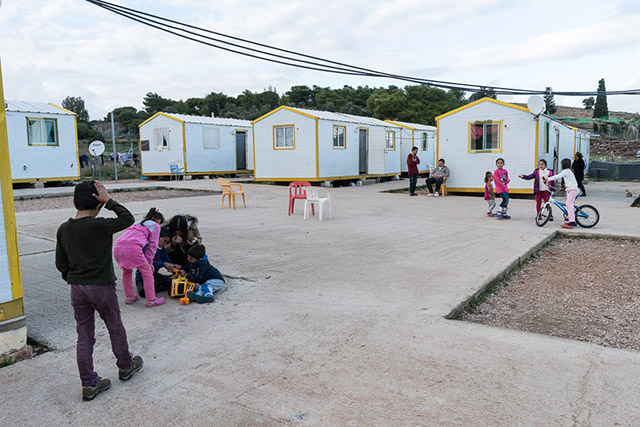 (Lavrio camp, Greece) 3 or 4 years ago, a 2nd camp was built on the outskirts of Lavrio, to shelter families in better conditions than those offered by the shared rooms in the main camp.
(Lavrio camp, Greece) 3 or 4 years ago, a 2nd camp was built on the outskirts of Lavrio, to shelter families in better conditions than those offered by the shared rooms in the main camp.
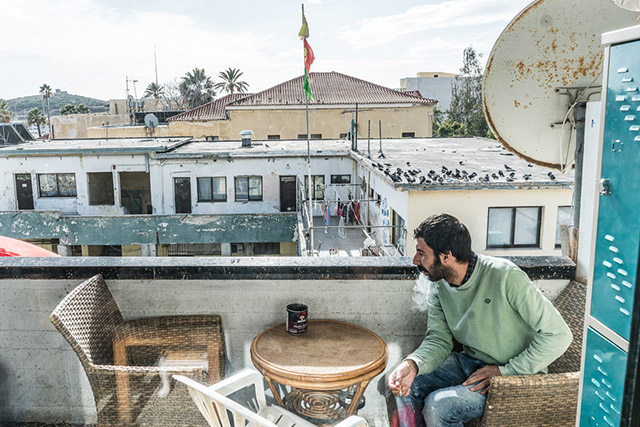
(Lavrio camp, Greece) Morning cigarette. For over 30 ans, the camp in Lavrio has sheltered Turkish and Kurdish political exiles. For the past 4 years, they have been joined by families fleeing war in Rojava. Hassan, a young teacher, had run out of his classroom, literally, to escape from the police come to arrest him. Because he had participated in demonstrations and supported the development of the Kurdish language, he was at risk of several years in prison in Turkey.
Up until July 31 2017, the Greek government provided daily aid to the exiles through the Greek Red Cross. But under pressure from Turkey, it abruptly ceased all contacts with the camp and its occupants, and has left the premises and completely withdrawn from all aid. A vague justification for closing down the camp was provided for “non-compliance with Greek and European laws”, notably as pertains to “entrances and exits”. If this kind of pressure exerted by Turkey is nothing new since regime opponents are in the camp, the inhabitants can now only rely on the solidarity of the locals and of organizations such as the Greek church which brings food parcels to the occupants every week. This, despite the fact the influx of exiles has not dwindled.
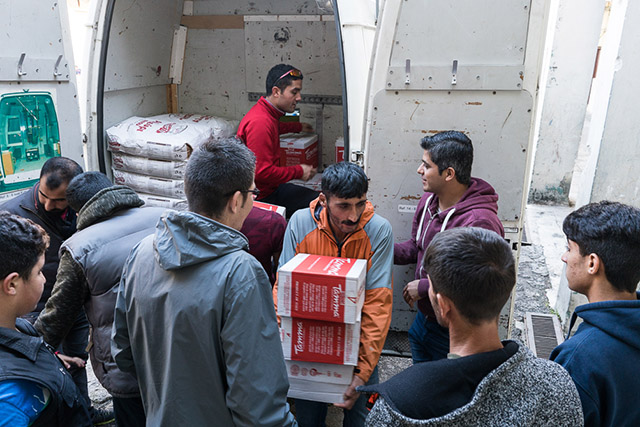
(Lavrio camp, Greece) On July 31 2017, under pressure from the Turkish State, the Greek government withdrew completely from the camp and ceased all aid. The Greek Red Cross vacated the premises it occupied in the camp and there is no further official aid. The only supplies come from activists, the church and individuals expressing their solidarity…
A self-governed camp
The camp occupants’ refusal to abandon their self-governance served as an excuse for the Greek State’s withdrawal.
“There’s an organization in the camp. A committee is elected by the occupants, of which I’m the spokesperson,” Sedat, a man in his forties, explains. “We organize daily life within the camp, we manage communications with the associations who come in, with the Greek government. We must also manage hygiene and life in general. Within this committe, there is also a youth committee subdivided into several sub-committees: culture, art…We must manage the circulation of people, the budget, it’s difficult but with so many refugees, it’s important work. The occupants choose their representatives and we manage as best we can until we leave. Then, they hold new elections.”

(Lavrio camp, Greece) The camp occupants choose the representatives who then organize daily living, notably, cleaning, chores, breadmaking…

(Lavrio camp, Greece) “I’ve been here for 5 months. In Kurdistan, I was responsible for the BDP in Bitlis”, Sedat says. “Managing daily life in the camp is complicated. You have to manage the circulation of people, the budget, it’s difficult but it’s important work as a refugee. The occupants choose their representatives and we manage as best we can until we leave. Then, they hold new elections”. Before they can leave the camp, members of the HDP must wait for an official regularization that can take months in coming.
“350 people live here. Women, men, in all kinds of situations. They can stay between a year to two and a half years. Most stay between 5 to 6 months. There is no governmental aid nor aid from international organizations. We must organize and cover all our expenses. We hope the Greek government won’t use any kind of force against us, but we think the Greek people will be on our side, the camp has existed for over 35 years. The PKK is well known locally, and so are the Kurds. The Turkish government has exerted pressure on the Greek government in an attempt to destroy this camp. We make a local contribution to the Greek economy by buying from the local bakery, and from the local shops. The Greeks are also suffering from a financial crisis, but we try to link up with the local people. We try not to be too much of a bother. We know we are in their country, that we are guests here.”
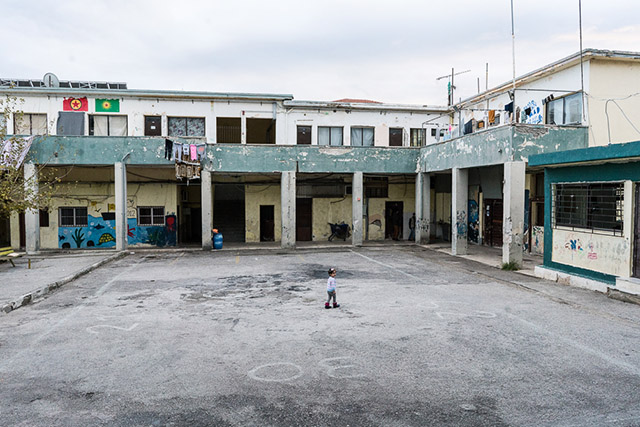
(Lavrio camp, Greece)

(Lavrio camp, Greece)
“We’re not here for the fun of it.”
He continues: “We’re not here for the fun of it. If there is war in our country, it is because of international powers, but we don’t judge the peoples of Europe. We would also love to be living in our country. The biggest need is for an official recognition of this camp, there are people from all four parts of Kurdistan here. We would wish to obtain the status of a refugee camp despite the attacks from the Turkish State. We do not wish to live in camps with people who joined ISIS. Three of our activists were murdered by the Turkish State in the heart of Paris, we don’t want to see that happening here. They still have a list of people they want killed, our occupants are afraid. And we want to protect them. This is why we want this official status. Refugees have rights, we ask international organizations to recognize us. The people here are not children of wealthy ones but we try to live in dignity. If they imagine they will make us back down by starving us to death, they are mistaken I don’t want to go into the details of our insufficiency of funds. As is the case for every woman, man, child, baby and young person, the people here have the same needs. Food, hygiene, everything you need to live with dignity, do we have all that? Of course not, but we try to live with minimal conditions. I have been here for 5 months. In Kurdistan, I was responsible for the BDP in Bitlis3. They wanted to jail me, I had to flee. Perhaps we were not brave enough to fight,” he concludes with a bitter smile.
We find many elected members of the HDP or of the BDP like Sedat in the camp. The story of each of the occupants in the camp in worthy of a novel. We meet several young people who had to leave Kurdistan because they were threatened with several years in jail for having upheld the use of the Kurdish language, for having participated in demonstrations, others for their political, cultural and social involvement.

(Lavrio camp, Greece) Murat was a teacher. Sentenced to several prison terms for his political activities (participation in demonstrations), he chose to flee.

(Lavrio camp, Greece) Cihan : “We chose to leave Sex Maqsud (translator’s note: a neighborhood in Aleppo). We crossed streets filled with corpses. My grand-daughters are orphans. A wall collapsed on them but they escaped unharmed. We took to the road around 3 AM with 5 families. We didn’t take any clothes with us. We arrived in Efrin and we lived for three months in a school with the other families. Local people brought us food. Then, we went through Turkey. My children worked there. They have all left for Germany. They have been alone over there for 3 years. We stayed those 3 years in Turkey. We had no rights in Izmir. I am alone here. I must have surgery, my son told me “get out of there”. We crossed the river. The police caught us and sent us to jail for 10 days. They sent us to the island of Kos. They wanted to take me even further away from my children, but I refused. They paid 3 000 euros to get out of Greece. My children are studying and working in Germany. Everything’s been destroyed in Syria, there’s nothing left for us there. God only knows if we will ever go back there. This is our fate.”
As a whole, the families from Rojava are less politically aware. They have fled from war, and have often lost members of their family. The camp is also a refuge for several women who had to flee alone with their children. For all of them the road was hazardous.
Mohammed relates : “We fled from Damascus. We arrived in Cizire,4then in Qamislo5for work. Then we passed over into South Kurdistan in Duhok, then into Turkey. We walked for over 9 hours. Once in Turkey, they asked us for 900 Turkey lira to take us to Istanbul? We stayed over 15 days over there. We went to Edirne,6my children had nothing left to eat. The police saw us and told us to to away, to go away from there. All they wanted was to get rid of us. We stayed with someone for two nights, and crossed the river to the other side around 7PM. We went through the forest. You have to be quick or else you never get through. We walked for a for long time. We have been here for 3 months. I don’t know when we will leave. When we will get out of here. The Assad government sentenced me to 6 years in jail, if only they told me I wouldn’t be sentenced, I would go straight back to Qamislo.”
Self-governance and daily management
Even more than the precarious living conditions, the hardest for the refugees is dealing with the waiting and the boredom that settles over them along with the feeling of no longer having any grip over the course of events. Despite the days that stretch out, all of them hang on to the hope of rapidly finding a way to reach the country of their destination.
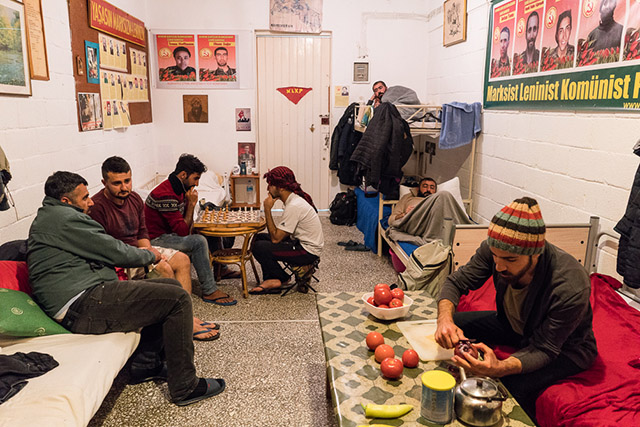
(Lavrio camp, Greece) In the camp, people relieve the boredom by reading, playing chess or tavla, discussing…the cell phone is indispensable as it allows for contacts with families, smugglers (forbidden within the camp) and entertainment.
For them, Greece is nothing but a transit station. Uncertainty about the future keeps them from investing fully in the present moment. Starting an activity in the camp, learning Greek, launching a project with an objective in the middle term, would be acknowledging that the wait may be long, thus pushing further into the future the goal they gave themselves when they took the hard decision to leave – a choice that was no such thing when the alternative was either prison or death; an expensive choice also, smugglers demanding several thousand euros at each stage of the journey, eliminating by the same token the ones who can’t afford to leave. Far from family and friends, the exiles’ morale gets eroded as the months go by, even if friendships are born in the camp between people sharing common histories and cultures. Reunions also, on occasion, with old companions from the struggle or from university.

(Lavrio, Greece) Rehearsal for eware, traditional comic skits from Diyarbakır.
A daily discipline is needed to fight against boredom. The main camp has some thirty living spaces. Some are occupied by entire families, others by individuals, some are reserved for women. Each room self-organizes. Money required for food is shared under the care of the designated “clerk”, and every week, the group goes for collective shopping at the market, which allows for cheaper purchases. Daily housecleaning and cooking chores are rotated.

(Lavrio camp, Greece) Room meeting to discuss organizing the week: who will cook, who will clean…This is also the time to smooth out the unavoidable tensions of collective living.
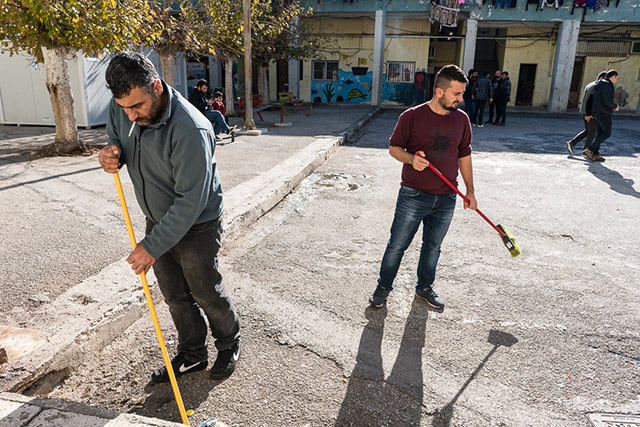
(Lavrio camp, Greece) The “cleanliness” committee organizes the cleaning chores within the camp. Having both lost their father, one in the guerilla, the other murdered by ISIS, Ismail and Ahmed met in 2015, when Ismail went to visit his brothers and sisters in the guerilla. Ahmed had been designated to act as his driver. The two men were reunited in the camp in Lavrio, and have been inseparable ever since.

(Lavrio camp, Greece) Every two to three days, a team is responsible for baking bread for the whole camp. The rest of the time, the exiles get their supplies at a local bakery where they are warmly greeted.
Every week, the occupants of each room meet to criticize and self-criticize, and to discuss ways to improve the organization. This is also the time for resolving any tensions that may have cropped up: so-and-so did not wash the dishes when it was his turn to do so, another stayed in bed past noon… Or to express one’s unhappiness, as did G. who talks about the depressing time at New Year’s, far from his family, after spending six months waiting, and seeing no end to it. Each room then designates a representative to the camp’s general assembly which chooses the elected committee for the overall organization. This system is based on that of democratic confederalism, the PKK’s political paradigm since 2005, which aims at organizing society in assemblies, from the lowest rung, known as the commune, to the largest. Within the camp, each room thus corresponds to a commune.
The youth committee also attempts to organize activities. Discussion sessions and debates are held four days a week. The passing months see different celebrations or commemorations. In December, for instance, a ceremony was organized to honor the martyrs of Roboski and, a few days later, a large section of the camp got involved in organizing the New Year celebration, a rare moment of collective relaxation.

(Lavrio camp, Greece) Homage to the victims in Roboski. Life in the camp is organized around commemorations and celebrations related to Kurdistan.
The rest of the time, the exiles relieve the boredom from morning till night by walking around the camp or by seaside and by drinking tea or coffee in the vicinity. Some go fishing early in the morning, others go to Athens for a few days to settle administrative formalities, to walk around or to visit acquaintances who have chosen to live there in one of the many self-administered squats in town. The Kurdish movement participated in the opening of City Plaza, notably, one of the most developed reception centers for exiles.
A lot of discussions occur in the camp, around everything and nothing, over news from Kurdistan, but mostly about ways to leave. Upon arriving in Greece, the exiles spend a few days in custody, after which they are given a paper informing them they must make an appointment to file a request for asylum. This official request often takes over a year to be processed, and the ones making the request are mostly political cadres to whom the Party forbids clandestine passages. The others seek clandestine means for leaving Greece and filing their request in another country. The Dublin III Rule stipulates that the asylum request must be processed in the country where it is first registered, a way for France and Germany to avoid dealing with exiles who arrived through other countries. However, none of the exiles wish to stay in Greece.

(Lavrio camp, Greece) Gafur, Siyar and Hasan have a coffee at the bakery next to the camp. Relations with the locals near the camp are rather cordial, the exiles make a point of participating in the local economy.
Since smugglers are forbidden access to the camp, the exiles contact them by phone. The smugglers send them photos of dozens of IDs from all European countries. Everyone then tries to find one with a face resembling his own. These are sold several thousand euros, with uncertain outcomes; several have tried to get through the controls with them, only to get caught. Others think to leave on foot, with or without smugglers, but failures are even greater that way. End of 2017, the situation became even harder with reinforced border controls. Siyar, who has been in the camp for 3 months, puts at only fifteen people or so the number of those who have managed to get through.
The exiles head where their family ties are or, failing those, where they have friends. Germany, Switzerland and Sweden are the destinations of choice. For many, France has maintained an image of sympathy towards the Kurds, but it has been largely tarnished by the conditions it has reserved to migrants these last years. Moreover, learning the language is complicated. For the younger ones hope to master the language of their host country as soon as possible in order to pick up their studies or their professional activity.
If the search for better living conditions spurs on most of the exiles, many also see it as a way to continue their political struggle sheltered from repression.

(Lavrio camp, Greece) Ismail is 32 years old. Several of his brothers and sisters have joined the PKK. Both he and his relatives have been imprisoned on a regular basis. In 2010 he had already received political asylum in Switzerland in order to escape a totally fabricated trial that ended in a dismissal. His father was a journalist and also distributed the Kurdish opposition newspaper Özgür Gündem. In 2014, as he was leaving for his morning distribution, he was murdered by members of ISIS who sent a video to Ismail to claim the murder and telling him he was next on their list. Turkish police did not want to do anything about it. Then the repression picked up and his passport was confiscated. His family begged him to flee so as not to go back to jail. He had to leave behind his wife and his three children. He has now been waiting for months for a way to join his other relatives in another European country.

(Lavrio camp, Greece) Little Sera and her mother Felek left Rojava after Felek’s husband was killed by Jihadists. They want to join their remaining relatives in a European country. Felek studied English for four years in university before returning to Rojava, in Sere Kaniye, before the civil war broke out in Syria.

(Lavrio camp, Greece) Diana (on the left) is from Rojava. She crossed the border between Turkey and Greece illegally, walking for five days. She has been in the camp with her mother and her sisters for two years and wants to reach her father in Germany. She goes to school in Lavrio during the school year. Her friend Ruha’s story is almost the same.

(Lavrio camp, Greece) Preparing a Kurte-sano show, a form of popular theater from Diyarbakir. Doğan (on the left) : “My name is Doğan. I am a journalist with the DIHA agency (banned by the Turkish State in the wave of repression following the attempted coup d’état in July 2016). I’ve also worked for Azadiya Welat. I had to flee following the repression in Turkey. The Turkish State has launched 27 trials against me and I have been sentenced to a total of 40 years in jail. I had no other choice than to flee. There was a massacre in Kurdistan, we could not keep silent. I am also married. Once I reach France, I want to pick up my studies and start working again.”

(Lavrio camp, Greece) 4 days a week, discussions are held on political and cultural topics…
As is the case in the cultural sector, for Hassan, a young literature professor who had to run out of his classroom to avoid arrest for upholding the use of the Kurdish tongue. The young man hopes to go on working for the recognition and development of the zaza dialect. In pedagogy, as for Dilek* who was destined for teaching until the police tried to force her into becoming an informer, threatening her with heavy jail sentences when she refused. Or to make known the PKK’s struggle, as for Fırat* : “I’ve been here for 3 months. I want to continue my activities in Europe. After living the Kurdish reality, it is essential to talk about it, to share our project. This is a moral duty for every Kurd. We must tell our story to the world. We must explain what is going on, we must tell of the sufferings, widen the struggle. (…) Democratic confederalism must not only take root only in Rojava, it must spread to the whole world. It may evolve in Rojava, but it must go on improving. It must not be limited to that area, but must spread to the four corners of Kurdistan. It is thus my duty to explain why I am here, it is my responsibility as a Kurd. We must fight for our people, for democratic confederalism.”
(*) the names have been changed.
Loez
December 2017
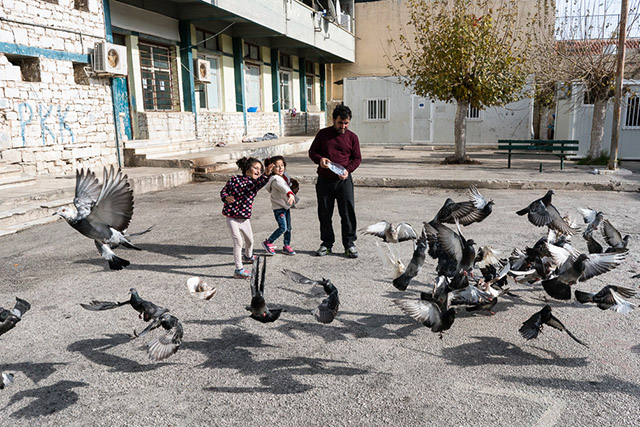
(Lavrio camp, Greece)


